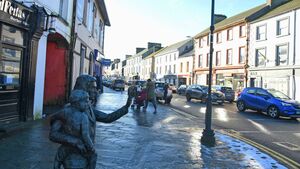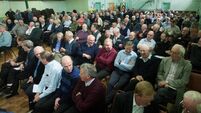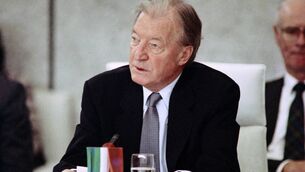‘It’s all about finding the right path in life’

Maria Boland has returned to her native Swinford after working abroad for over two decades.
Maria Boland is a naturally caring person. Her family has been in the undertaking and pub business in Swinford for years. Maria herself went to the UK at 18 and qualified as a nurse, a job which brought her to other countries and various specialties.
But she has always been drawn to the family businesses and, in particular, undertaking. But there are similarities in the way in which she talks about both professions – a distinct want to care for people in the most vulnerable times of their lives.
Maria now runs the family business in Swinford and sat down to chat with me about her path to where she is now.
Angelina: Maria, thanks for chatting with me, can you tell me a little bit about yourself and your background?
Maria: So I am from Bridge Street in Swinford. I grew up here in the family business which was the pub and undertakers, with my Gran, Mum, Dad, and siblings. At 18, I went to England to first of all become a social care worker. I hopped on the bus the night after my debs in 1998. And I was lucky to live with my aunt and uncle over there. I did the course and then leaned towards nursing. So I became a nurse and worked in that profession for years.
Angelina: You seem to have a leaning towards helping people Maria, be it social care or nursing?
Maria: For me, it’s about being a positive person. You only have one life, so you’re trying to do as best you can do, something nice or positive, or you can help someone. It was always something in our house, if you can help a person, you do the best of your ability to help a person.
Angelina: You enjoyed nursing and did a variety of roles?
Maria: I worked in different hospitals for different skills. So my first job was gynecology, palliative care and early pregnancy nurse. Then I left to go traveling.
Angelina: And with nursing, you could really go anywhere to work?
Maria: My father always encouraged me to go and see the world. He was always very encouraging to us. So in 2006, I took off with my friends and we started off in Asia and then went to Australia. I wanted to start at the top of the country and get a camper van. So we bought a van and travelled down and then I left them in Sydney. And I spent just under three years in Australia in total.
Angelina: What was the next step on your journey then?
Maria: My mother got diagnosed with breast cancer in 2008 and that’s when I came home. I wanted to come home and help out. I didn’t want her to go through it without me being here. I worked here for a little while, one project was a six-month contract where I went into people’s houses and treated them there. It was similar to what they do in Australia. A really worthwhile project.
Angelina: But you went back to London then?
Maria: I got a fantastic job then in The Royal London. I had worked in trauma in Australia. The Royal London was the first hospital for polytrauma. You go into one ward with everything until there’s only one thing left wrong with you. You’re treated for all the stabbings, gunshot injuries, broken bones, head injuries - everything in one ward. And we had a surgical (high dependency unit) HDU at the back of it. And as a nurse, you would rotate between the two. It was a fantastic experience.
Then the Olympics happened [in 2012] and our hospital got closed down - the old hospital. And they built a new hospital which is 18 floors in Whitechapel. And our department got broken up. I chose to stay on in HDU and they amalgamated the HDU with the ICU (adult intensive care unit). So we had a whole floor of the new Royal London Hospital of Intensive Care and all HDU together. And it was an amazing experience.
Then from there, I went to St George’s because they had a really good endoscopy and bowel cancer screening unit and I wanted to know a bit more about that. I wanted to know a bit more about the diagnostics and stuff like that. I did that for a few years. And that was another skill set.
We were always told while training to not become stagnant and to try and gain experience in as many different areas as possible. I also worked on a project called (STARRS), which was set up by a nun to improve the healthcare services between the community and hospitals in London. We worked in the rapid response team, A&E, and early discharge and made sure were cared for properly in their homes.
Angelina: You left that role when your Mum became ill again?
Maria: Yes, my Mum became palliative, so I felt I couldn’t give myself 100% to the role I was in, so I came back. I went into agency nursing for a while. My Mum passed away in 2017. She was an amazing woman. I don’t remember her for her illness - I remember her as herself.
After my Mum died I worked here for a number of months and went to the UK for a period too. And when the pandemic hit, I worked in ICU for a while in the UK. It was a very surreal time then. Healthcare doesn’t stop and people probably haven’t really gotten over what they experienced.
Angelina: So you came back in February of last year and moved into the family business - which is the undertakers and the pub?
Maria: Yes, I always wanted to do undertaking. I don’t know if it ties in with the nursing side of it or not. But I think the last thing you could give to a person is dignity and respect. And you hope to make the person of the loved one proud, even though they’re no longer with them, but also help the family. It’s an absolute honour. If you help that person fulfill their wishes, it’s lovely. It’s very peaceful.
Angelina: Undertaking is such an important job and is very much a business that is handed down through generations in this country.
Maria: It is and it’s not an easy job because you’re there for that person during the worst part of their life - when they lose a loved one. It’s a 24/7 job, it’s not a 9am to 5pm job. You can never predict when people are going to pass away.
I love to hear about the person who has passed. What were they like? What was their personality like? What would your loved one want? I love to hear the story about the person. So in your own head, when you meet the deceased person you know what their personality was like and a little about who they were.
Angelina: I’d imagine for those few days after a person passes away, you become part of the family in terms of support and the work you do.
Maria: Oh, you are. You’re there to help the family and what you can do for them and all that. You do your best. There is a format to how we do funerals but you help the family to get to that point, and answer the questions to the best of your ability. Or if you can’t, you find other people that can maybe help them.
Angelina: I think we do funerals very well in Ireland. I think there is a lovely ritual to it. Has the way we do funerals in Ireland changed much over the years?
Maria: I suppose the biggest change will be more social media from the pandemic because you had to rely on social media. You can now watch most funerals online, which is great. That’s a massive thing. But here our culture means we really do celebrate our loved ones, the deceased. If they’re in the funeral home or their own residence, families and friends can visit and say their goodbyes and pay their last respects.
Angelina: Are there more cremations now in Ireland?
Maria: There’s a lot more. Because lots of families maybe want to split the ashes or bring their loved one’s ashes to their favourite place. You see a lot more of that, which is lovely as well. It’s very individualised - it’s very personalised.
Angelina: As a funeral director, you are with families at a very vulnerable time - they are almost looking to you for guidance.
Maria: As a funeral director, you are the guide for the person to give them direction on where to go, and what you can do. But being a nurse, I do think about how grief can sometimes affect us. People need to be aware of the aftercare, everyone reacts differently. There is support out there because you do not always have good days after death. It’s painful but not like a normal pain. It hurts. It can really physically hurt too. But as I always like to say, it’s normal to feel that way, you can’t skip grief. You cannot skip it. For every tear you shed, that’s a tear of love.
Angelina: Maria, do you think you are in a place you’re meant to be with your work now?
Maria: Yes. I definitely think it’s meant to be. We all have a pathway and it’s about finding the right path. I’m very lucky to have my dad to support me. I’m very lucky that the undertakers’ community and parishes have been a great support too, which is fantastic. I have to say that I’ve been very blessed. And the community in general has been brilliant.





